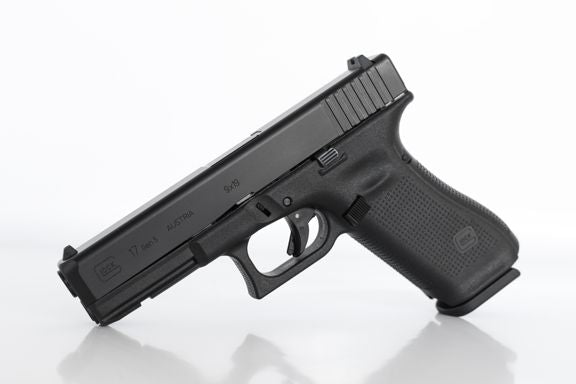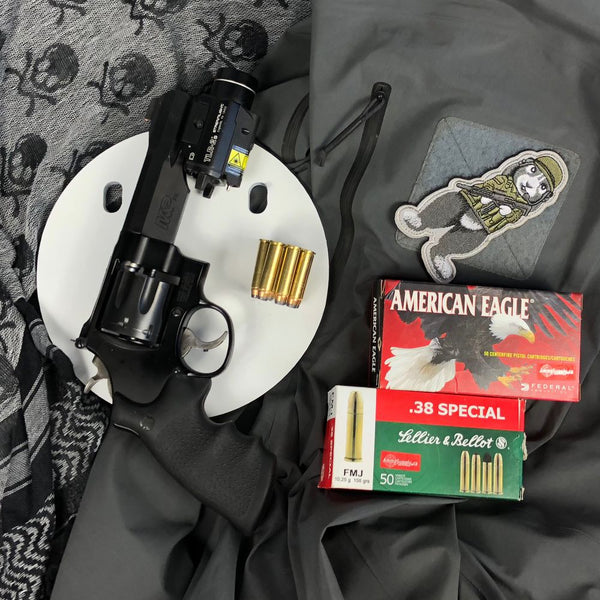Why You Should Try Shooting IPSC

Why You Should Shoot IPSC
Recently, I posted about several shooting sports that can add excitement to your range days. In this post, I'm going to focus on IPSC (pronounced IP-Sick, International Practical Shooting Confederation), and tell you why it's such a great sport for runnin' & gunnin'.

Where I live (Alberta, Home of the Free) we shoot IPSC with handguns, in some places they shoot a carbine variant (aka IPSC Rifle). I'm going to write about the handgun version, but the rifle matches are very similar.

An IPSC match is a full day of fun, often with 60 to 120 shooters registered. The photo above shows a typical stage; a match might have six stages set up, squads of shooters move from stage to stage. In the picture above, several targets have been set up on the range with walls and vision barriers to guide the shooter's path through the stage. A Range Officer (holding a timer) stands behind the shooter; another RO supervises, holding the scorecard. When the shooter is ready, the RO will beep the timer and the shooter will move through the stage, putting a couple of rounds in each target, and when finished the RO will score his accuracy. A formula combining accuracy and time nets the score. Brag to your squadmates, tape up the bullet holes, and move on to the next stage!
If you're used to standing in a narrow indoor range, shooting one target at a time, you'll be amazed at how much different is outdoor action shooting. By the end of the day you've had some exercise, hung out with friends, and challenged yourself. Ultimately it doesn't matter whether or not you score well; many IPSC shooters go to matches for years without ever looking at their scores.
What's awesome about IPSC
All action shooting is good fun, but IPSC stands out for a few reasons. The first is that it's a big league with hundreds of shooters in each province, and that's important. Stages are build by volunteers, sometimes the morning of the match, and bigger groups make it easy to set up big stages with lot's of targets and fun props. Also, if you're a competitive person, the fact that a lot of people shoot IPSC create a large sample against which to compare your scores.
IPSC's size has created a rich infrastructure of trained Range Officers and Match Directors, a well-tuned rulebook, and for new shooters an excellent training program called Black Badge. Everyone who shoots an IPSC match must first take the two-day Black Badge course which teaches the basics of action shooting and, most importantly, the specific safety issues of moving with a loaded gun. How to run, turn, or kneel; simple tasks that take on new meaning with a 9mm in your hand. Even if you never shoot an IPSC match, taking the Black Badge course is the best way to build your skills in drawing from a holster and moving with a firearm.
IPSC deserves a lot of credit; it has taken a dangerous activity (running with a gun) and turned it into a (somewhat) safe family event suitable for normal decent people. Combine that with competition for better scores and a great way to practice your skills, and IPSC is without equal in handgun sports.
Why some shooters avoid IPSC
I love IPSC, but it's not for everyone. For starters, the matches are often large and can have a 'tournament' feel. One shooter after another, fast-paced, then onto the next stage; it can lack the laid-back feel that some people prefer for their weekend pastime.
Also, because IPSC is a competition many shooters take their scores seriously, some say too seriously. Every inch of your belt might be measured for rules compliance, every footstep measured against the marked shooting area. When you see five adults studying a target to determine if two bullets passed through the same hole (then calling a supervisor for a sixth opinion), some of the fun goes out of it. Many matches are just fun and casual, but some people won't enjoy a sport where every other person seems to be carrying a rule book, and those people won't like IPSC.
You can do it
I'm middle-aged and (some would say) fat; my wife is five feet tall and about a hundred pounds. If we can shoot IPSC and have a great time, so can you.
A lot of shooters ask about the equipment they need. The short answer is a handgun, four magazines, a sturdy belt, a kydex holster, and kydex pouches for those mags. Of course, you could be a true individual and use a revolver and a pocketful of loose rounds, but... don't. If you don't have a suitable handgun (and can't borrow from a friend), buy a CZ Shadow 2, a total of five magazines, a kydex holster and two double magpouches (the fifth mag goes in your pocket). The Shadow is a popular gun in IPSC and works well without modification. With some experience you may decide you want something else, but the Shadow is excellent.
If you haven't been to an IPSC match, watch some on YouTube. If that doesn't scare you off, you can go watch a match at your local club; a free and easy way to feel the vibe. Next, find a local Black Badge instructor. BB courses are offered at many ranges, but sometimes info can be hard to find; if your local gun store can't refer you, just ask around at a match, one of the shooters will be an instructor.
If you're new to action shooting, start with IPSC. If you have questions about getting started in IPSC, send me an email at info@RangeRabbit.com



